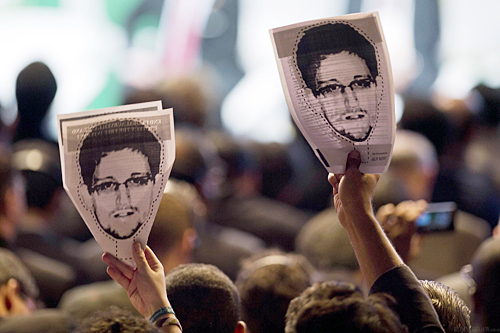|
 |
|
PRISM FALLOUT: Demonstrators hold portraits of U.S. whistleblower Edward Snowden in a protest during the opening ceremony of the Global Multistakeholder Meeting on the Future of Internet Governance on April 23 in Sao Paulo, Brazil (XINHUA/AFP) |

Washington broke out in full legalistic fury and filed judicial litigation against five Chinese military officers on May 19, accusing them of hacking into U.S. corporations' networks to steal trade secrets.
In fact, the U.S. Government has sought to include the so-called "cyber threat from China" into judicial and legislative fields since 2013. On February 20, 2013, it issued a report titled Administration Strategy on Mitigating the Theft of U.S. Trade Secrets, establishing a strategy to prevent foreign competitors and governments from stealing trade secrets by any method including via cyber space. While claiming "cyber spying" has become a major threat to U.S. cyber security, the United States widely singles out China as a cyber threat and accuses the Chinese military of hacking.
Feeling insecure
Filing lawsuits is not Washington's ultimate goal. It conceded that the lawsuit was aimed at conveying a public message to China and forcing Beijing to "take actions." But why did Washington abandon the existing China-
U.S. cyber security working group and dialogue mechanisms, only to take such a provocative unilateral action? The reason is that today's cyber world may not follow what is in accordance with Washington's strategic conception and arrangement. Washington has clearly become anxious as China poses a strong challenge to U.S. interests in cyber space.
Cyber security has undoubtedly been at the core of Washington's multiple interests in cyber space. The U.S. security concept changed following the September 11 terrorist attacks in 2001. Former U.S. Secretary of Defense Donald Rumsfeld once said there is no way for the country to find out when and where U.S. interests would be attacked, or when Americans would be at risk of terrorist attacks. Its sense of insecurity is particularly strong in the realm of cyber space.
In one way, the United States has realized the fragility resulting from high reliance on the Internet. By carrying out a cyber military buildup, it seeks to develop deterrent and preemptive cyber strength, so as to obtain absolute military advantage—all compiled in cyber space. In another way, it has learned that the Internet has developed beyond any country's control, such that related problems can only be solved through international cooperation and coordination. To maximize U.S. interests, the country has kept control of rights to distribute important Internet resources and formulate technical standards in the cyber world, aiming to firmly hold dominance over the Internet.
China has been targeted as Washington's top imaginary rival as the latter pursues dominant military strength in the cyber world. One explanation of U.S. behavior is today's strategic architecture in which China is rising as a strong power. Another reason is that the United States believes China is highly capable of conducting cyber warfare. An investigation of the U.S.-based Foreign Affairs magazine showed that China's capabilities of cyber warfare are second only to the United States. Therefore, the United States finds learning the real strength of the Chinese military's cyber attack and defense abilities is crucial to its security. During talks with Beijing about Internet issues, Washington repeatedly requested China enhance transparency of cyber space and establish a mutual trust mechanism, citing the need to "eliminate miscalculation." It also suggested carrying out direct dialogue between the two country's military forces.
However, since the related mechanisms have just been formed, they have yet to satisfy Washington's strategic needs. By exaggerating recent events, Washington intends to observe Beijing's reactions, so that it can uncover Beijing's stance and its Internet coordination and response mechanism. By choosing military officers as the trigger, Washington may try to force the Chinese military to directly respond, which will facilitate its intended test.
| 